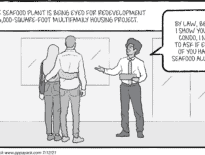
Cape Cod’s economy is starting to suffer thanks to a lack of housing for working families and seasonal employees.
By this point, if you haven’t heard that Cape Cod has an affordable housing crisis, then you must have been living under a rock for the past two decades.
Advocates and public officials alike have spent years now lamenting the lack of pretty much any housing – let alone anything affordable – for the blue-collar and seasonal workers who pick up the trash, put out the fires and keep the restaurants and shops humming in Massachusetts’ playground.
And the problem has gotten so bad now the head of the Cape’s chamber of commerce is even warning of businesses having to cut back on what they offer.
Think of your favorite bakery no longer able to offer lunch, or the local veterinarian so short-staffed as to be unable to take any last-minute appointments.
“All of us on Cape Cod, whether we are visiting or living here, are going to see the impacts of our housing crisis,” Wendy Northcross, CEO of the Cape Cod Chamber of Commerce noted on a recent conference call on the Cape’s housing crisis, according to the State House News Service.
But here’s the rub: If the Cape’s housing crisis could be solved by words of warning and good intentions, there would already be thousands of new apartments across the Cape.
Few Units Built for Decades
Concern over the lack of affordable housing on the Cape dates to at least the 1990s, with at least one big study completed by the early 2000s.
Yet while awareness of the Cape’s dearth of affordable housing is high, construction of new housing, especially badly needed rental units, remains stubbornly low on one of the world’s best-loved peninsulas, to the point of being downright pathetic.
Just 56 multifamily units were OK’d across the Cape last year, according to the U.S. Census Bureau, which does not distinguish between condominiums and rentals. The vast majority, or 40, were two-families, with just 16 in buildings with three or more.
Builders pulled permits for 86 multifamily units in 2019, plus a more robust 487 units in 2018 and 382 in 2017. But just 10 were permitted in 2016, all in buildings with just two units each.
The vast majority of those, though, were likely condos.
Since 2000, for example, nearly all residential construction in Falmouth has involved single-family homes and condominiums, though it appears that a small increase in two- and three-unit structures and mixed-use properties occurred as well, according to a town report.
By contrast, local officials in Greater Boston issued permits for roughly 9,800 new apartments and condos in 2020, with the vast majority in buildings with five or more units.
Strategic Rethink Needed
In fact, new rental buildings with fixed, affordable rents are so rare on Cape Cod that when one gets built, it is a cause for major celebration.
A recent groundbreaking for Brewster Woods, a 30-unit affordable rental project on the mid-Cape town, drew both Bourne U.S. Rep. Bill Keating and state housing and economic development chief Mike Kennealy.
“The lack of affordable housing on Cape Cod is one of the greatest threats facing our local economy, and the construction of Brewster Woods is a big step in the right direction,” Keating said, according to the Cape Cod Times.
OK, great project, but a couple dozen affordable units is a drop in the bucket when it comes to dealing with the Cape’s affordable housing crisis.
Let’s get real here: If there is to be any hope of making a dent in the Cape’s affordable housing crisis, the region’s housing advocates and elected leaders need to dramatically overhaul their strategy.
Everyone knows the Cape has a housing crisis, but far fewer understand the reasons for it.
While demand has long outstripped housing supply, a small but vocal number of affluent homeowners in towns across the Cape have prevented the market from filling this gap.
Time to Assign Blame
These NIMBYs have managed to keep projects stuck on the drawing boards, jamming local boards, state agencies and the courts with relentless objections and appeals to kill new housing with a thousand and one delays.
One needs to look no further then Wellfleet, where neighbors opposed to the construction of eight affordable units have struck a tentative deal with the developer.
Opposition by abutters has held the project up for 20 years – that’s right, 20 years – with the town having taken over the site way back in 2001 for nonpayment of taxes, the Provincetown Independent reports.
Abutters argued that wastewater from the apartments would pollute their wells. The claims were eventually dismissed by both state environmental officials and in court, but opponents managed to slowly choke the project for years until the 2008 recession did the rest.

Scott Van Voorhis
Developer Ted Malone, president of Community Housing Resource of Provincetown, revived the project in 2017, but it still took another four years to get to this point, and it’s still not done, with an official settlement not yet inked.
Want to get more affordable housing built on the Cape? Then it’s time for politicians, business leaders and housing advocates to start making life less comfortable for NIMBYs opposing these projects.
I am sure some opponents are beyond public shaming, but I bet there are others who might be more willing to compromise if they knew they and their actions were suddenly being called out publicly.
As they say, a little sunlight can sometimes be the best disinfectant.
Scott Van Voorhis is Banker & Tradesman’s columnist; opinions expressed are his own. He may be reached at sbvanvoorhis@hotmail.com.




 |
| 

